A family comes to me, and their child has been sexually abused.
They’re overwhelmed, they’re dealing with this nightmare of a child who’s been abused, and then they’re also faced with criminal proceedings, civil proceedings. “Where do I get therapy for my child?” And there’s no handbook for parents. They don’t know where to turn. So, my role in these cases is to help guide them through this maze, and I try to sit down and kind of provide for them a road map.
And we talk about the three areas, really about the three components that I say contribute to the healing. The goal of this, at the end of the day, is to help them and their child heal, and also, the parents. It’s not just the child who’s a victim when there’s an abuse. The whole family’s abused, and it’s important for everybody to be involved in that process.
There are three components to a case like this. There’s a criminal proceeding, and the criminal proceeding is where you go to the police, and there might be a prosecution against the perpetrator. Now, that is often frustrating for victims, because what they don’t realize often times is that they’re not a part of that lawsuit, and the prosecutor can decide not even to file charges, dismiss the case. They don’t control that process, and so, it’s frustrating, but if you go into the understanding that you don’t control it, I think it’s important, critically important, to participate, because it validates your child, and it sort of shows them that a crime was committed, and it was wrong.
The second part is a civil proceeding, which is where I get involved more, which is actually handling the civil cases. After we file a civil lawsuit typically against the institution and the perpetrator for committing this crime, and for the institution for being negligent, typically, in a situation like this. The civil lawsuit, I think, is very important, because, number one, it also validates to the victim that something happened and you’re holding them accountable. It’s a process, however, that the family does control.
The other thing is that by coming forward and exposing predators and the institutions that protect them, you are not only empowering the victim, but you are also protecting children in the future. The best way to get change, to protect children is to hold an institution accountable. The third critical, critical element of the healing process is to make sure that the child and the family get into therapy and have a professional support staff in addition to non-professional support in these cases. Being able to process what happened with the right kind of guidance is really important and allows a victim to begin that healing process.
